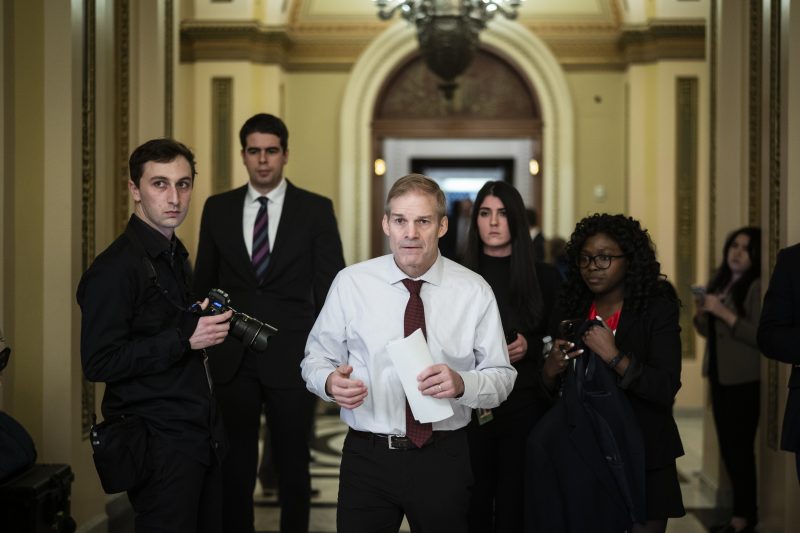The House on Tuesday approved a GOP resolution to create a select subcommittee that Republicans say will launch a far-reaching examination of the agencies and people that investigated Donald Trump and that Democrats describe as an unprecedented breach of protocol on criminal probes and national security matters.
The subcommittee, approved on a party-line 221-211 vote, will be empowered to investigate any federal agency that collects information about Americans, even in cases of an ongoing criminal investigation — a carve-out at odds with the Justice Department’s long-standing practice of not providing information about ongoing investigations.
The subcommittee, which will be housed under the Judiciary Committee and led by that panel’s chairman, Rep. Jim Jordan (R-Ohio), is expected to have resources akin to the House select committee that investigated the Jan. 6, 2021, attack on the U.S. Capitol — a concession extracted last week from GOP leaders by hard-line detractors of Rep. Kevin McCarthy (R-Calif.) in exchange for the votes necessary to make him the new speaker.
The broad resolution also explicitly authorizes the select committee to seek access to highly classified information provided by intelligence agencies to the House Intelligence Committee. Members of that panel are often briefed on extremely sensitive information with contents that, if widely shared, could damage national security and endanger the lives of American intelligence officers and their assets.
“It’s mandate is whatever Jim Jordan wants to do,” said one congressional investigator who works on oversight issues and who, like others in this report, spoke on the condition of anonymity to discuss internal discussions and plans.
Republicans, who have accused Attorney General Merrick Garland of abusing investigative powers to target conservatives, have compared the new committee to the Senate Church Committee formed by Democrats in 1975 to investigate civil liberties abuses by intelligence agencies. Democrats have countered that the committee has been born out of the grudge match over the FBI’s investigation of one person: Trump.
“Jim Jordan and Kevin McCarthy claim to be investigating the weaponization of the federal government when, in fact, this new select subcommittee is the weapon itself,” Rep. Jerrold Nadler of New York, the ranking Democrat on the House Judiciary Committee, said in a statement. “It is specifically designed to inject extremist politics into our justice system and shield the MAGA movement from the legal consequences of their actions. In order to become Speaker of the House, Kevin McCarthy sold out our democracy by handing power-hungry Jim Jordan subpoena power and a green light to settle political scores under the phony pretext of rooting out conservative bias.”
The Justice Department declined to comment on the proposal.
Rep. Thomas Massie (R-Ky.) told reporters Tuesday that he will be serving on the subcommittee, but it’s unclear who else will be tapped by GOP leadership.
Rep. Nancy Mace (R-S.C.) said after the vote to form the committee: “Jim Jordan is the most powerful chairman in Congress, with broad discretion on what he wants to investigate now. What I’m interested in seeing is who will be sitting on this committee. [Jordan] gets to handpick.”
While the resolution establishing the subcommittee is ambitious — alarmingly so to Democrats, who view the panel as a political attack machine disguised as an oversight body — how it will work in practice remains to be seen.
The Justice Department has at times quarreled with congressional committees over what information should or should not be shared with Congress, including during the Trump administration when Jordan and others accused the Justice Department of unfairly targeting the president.
Such fights can drag on for months and occasionally flare into uglier confrontations, such as when the GOP-controlled House in 2012 voted to hold Attorney General Eric Holder in contempt over Republicans’ unsatisfied demands for Justice Department documents.
While some of the panel’s expected membership sets the stage for potential confrontations with the Biden administration, some Democrats and intelligence officials are already voicing concern about the chilling effect the Republican effort may have on ongoing investigations.
Some Republicans, for example, have already expressed skepticism about reauthorizing one of the government’s crown jewels of intelligence gathering: Section 702 of the Foreign Intelligence Surveillance Act, which expires later this year. It’s possible that Republicans will hold the program hostage if the Justice Department and other relevant agencies decline to answer the subcommittee’s requests, though such threats have proved hollow in the past.
The new panel will consist of eight Republicans and five Democrats, and unlike on other committees, members of the subcommittee do not have to serve on the Judiciary Committee to be appointed. Democrats are not planning to boycott the committee, according to people familiar with the matter, as McCarthy did when he pulled his picks to serve on the House Jan. 6 panel. It’s also possible that some lawmakers who are currently under investigation by the Justice Department may be taking part in the examination of federal investigations.
Rep. Scott Perry (R-Pa.), whose phone was taken as part of a Justice Department investigation of the use of illegitimate electors in efforts to overturn Joe Biden’s victory in 2020, declined to recuse himself from possibly sitting on the subcommittee, telling ABC News over the weekend that being a subject of an investigation shouldn’t be disqualifying.
“Why should I be limited, why should anybody be limited, just because someone has made an accusation? Everybody in America is innocent until proven otherwise,” Perry said. “I would say this: The American people are really, really tired of the persecution and instruments of federal power being used against them.”
Democrats also predict that the new panel will worsen the relationship between intelligence agencies and Congress, because of concerns about political battles over classified information.
Congressional investigators anticipate the subcommittee will need to hire a team of outside litigators to handle a looming fight over congressional oversight authority that could end up in the Supreme Court.
“There are already grand jury regulations and rules that will prevent the Justice Department from complying with subpoenas related to ongoing investigations — like the January 6 investigation — but Jordan will likely say that he’s authorized by Congress, so they will end up in court,” said a second congressional investigator. “This isn’t going to end anytime soon.”
A previous version of this article incorrectly identified McCarthy as a Democrat. He is a Republican. The article has been corrected.








